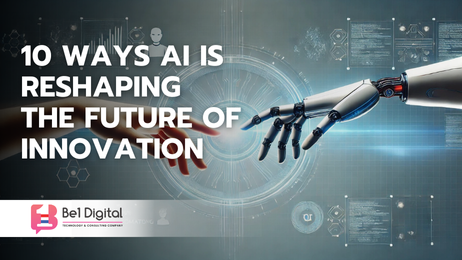
10 Ways AI is Reshaping the Future of Innovation
Artificial Intelligence (AI) is more than an emerging technology—it’s redefining industries, reshaping job roles, and pushing the boundaries of innovation. Whether it’s automating routine tasks, enhancing creativity, or fueling business growth, AI’s influence on the future of work is undeniable. But with great power comes great responsibility. How can we harness AI’s potential while navigating its challenges? Let’s explore the evolving role of AI in the workplace and beyond.
AI’s Impact on the Workplace
-
1. Streamlining Repetitive Tasks
AI automates mundane, repetitive tasks that once consumed valuable time and resources. From virtual assistants handling administrative work to AI-driven chatbots managing customer inquiries, businesses are experiencing increased efficiency and reduced operational costs.
-
2. Empowering Smarter Decision-Making
AI’s ability to process and analyze massive datasets in real time is revolutionizing decision-making. Predictive analytics, machine learning, and AI-driven insights help businesses make data-backed choices, optimize strategies, and anticipate market trends.
-
3. Boosting Productivity and Collaboration
With AI-powered tools assisting in content generation, data analysis, and workflow automation, employees can focus on higher-level tasks that require critical thinking and creativity. AI-enhanced collaboration platforms also improve communication, making remote and hybrid work models more seamless.
-
4. Redefining Job Roles
AI isn’t just replacing jobs—it’s transforming them. While some positions may become obsolete due to automation, new roles in AI development, data analysis, cybersecurity, and human-AI collaboration are emerging. The future workforce will need to adapt, embracing AI literacy and developing skills that complement machine intelligence.
AI’s Role in Business Innovation
-
1. Revolutionizing Customer Experience
AI-powered personalization is enhancing customer interactions like never before. From product recommendations tailored to individual preferences to chatbots providing instant support, businesses are leveraging AI to improve engagement and customer satisfaction.
-
2. Optimizing Business Operations
AI is refining everything from supply chain logistics to fraud detection. Automated inventory management, predictive maintenance, and AI-driven risk assessments are helping businesses operate more efficiently and cost-effectively.
-
3. Accelerating Research and Development
In industries like healthcare, pharmaceuticals, and technology, AI is expediting the research and development process. AI-driven simulations, automated testing, and deep learning models are reducing the time and resources required to innovate.
Challenges and Ethical Considerations
-
1. Job Displacement & Workforce Adaptation
The rise of AI-driven automation raises concerns about job security. While some roles may diminish, investing in upskilling and reskilling programs will be crucial to helping workers transition into AI-integrated roles.
-
2. Ethical AI & Bias Mitigation
AI systems can inherit biases from training data, leading to ethical dilemmas in hiring, lending, and law enforcement. Ensuring transparency, accountability, and fairness in AI algorithms is essential for preventing discrimination and unethical decision-making.
-
3. Data Privacy & Security Risks
AI thrives on data, but with increased data collection comes the challenge of protecting sensitive information. Strong cybersecurity measures, regulatory compliance, and ethical data usage policies are necessary to maintain trust in AI-driven systems.

